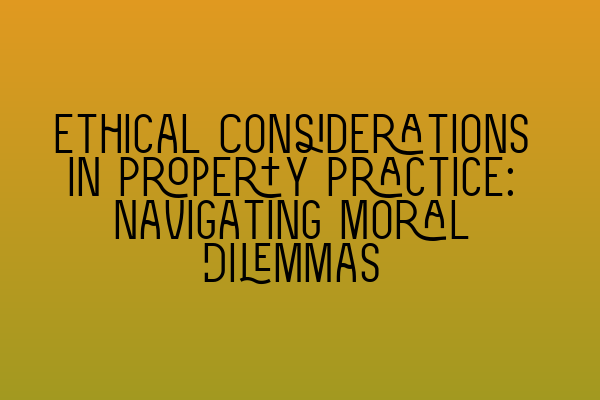Ethical Considerations in Property Practice: Navigating Moral Dilemmas
As a solicitor specializing in property law, it is essential to not only possess an in-depth understanding of the legal framework but also to navigate the complex terrain of moral and ethical considerations. The decisions we make as legal professionals have a lasting impact on our clients, communities, and even the environment. In this blog post, we will explore the importance of ethical decision-making in property practice and discuss strategies for effectively navigating moral dilemmas.
The Significance of Ethical Considerations
Property transactions, whether it involves buying, selling, leasing, or developing property, are inherently intertwined with ethical considerations. Each decision made has the potential to affect multiple stakeholders, including the client, other parties involved in the transaction, and the broader public interest. By prioritizing ethics in property practice, solicitors can ensure that their actions align with their professional responsibilities and contribute to the betterment of society.
At SQE Property Law & Land Law, we believe that ethical dilemmas should never be taken lightly. It is important to constantly reassess the impact of our actions on various aspects, from human rights and environmental sustainability to fair housing practices and community development. By critically examining each situation, we can unveil the best course of action that not only complies with the legal requirements but also upholds the highest ethical standards.
Strategies for Navigating Moral Dilemmas
Navigating moral dilemmas requires a thoughtful and systematic approach. Here are some strategies that can help solicitors in property practice make informed and ethical decisions:
- Conduct Extensive Research: Stay up-to-date with the latest developments and updates in property laws and regulations. This will help you understand the legal framework within which you operate and identify potential ethical challenges.
- Establish Open Communication: Maintain an open line of communication with your clients, ensuring transparency and clarity throughout the process. This allows you to address any ethical concerns or conflicts of interest that may arise.
- Implement Ethical Decision-Making Models: Utilize ethical decision-making models, such as the “principles approach” or “consequentialism,” to systematically assess the ethical implications of each decision. These models offer a structured framework to evaluate the consequences and potential harms and benefits involved.
- Consult with Colleagues and Experts: Seek advice and guidance from colleagues, mentors, or experts within the field of property law. Collaborative discussions can provide new perspectives and help you consider alternative solutions to ethical dilemmas.
- Continuing Professional Development: Engage in continuous learning and professional development opportunities that specifically address ethical considerations in property practice. This will enhance your knowledge base and equip you with the necessary skills to navigate moral dilemmas.
By integrating these strategies into your everyday practice, you can enhance your ability to make ethical decisions when faced with moral dilemmas, ensuring that your actions align with your professional and moral obligations.
Related Articles
If you found this article helpful, be sure to check out our related articles:
- SQE Preparation for Property Practice: Mapping Out Your Strategy
- Updates in UK Property Laws: Key Changes and Implications
- Legal challenges in property transactions: A comprehensive guide
- Navigating Lease Laws in the UK: Essential Guidelines for Tenants and Landlords
- Dominate Property Law Questions: Avoiding Common Pitfalls
At SQE Property Law & Land Law, we are committed to providing comprehensive and ethical legal services to all our clients. If you have any questions or require assistance with your property transactions, please do not hesitate to contact us. Our experienced solicitors are here to help you navigate the complex field of property law.
